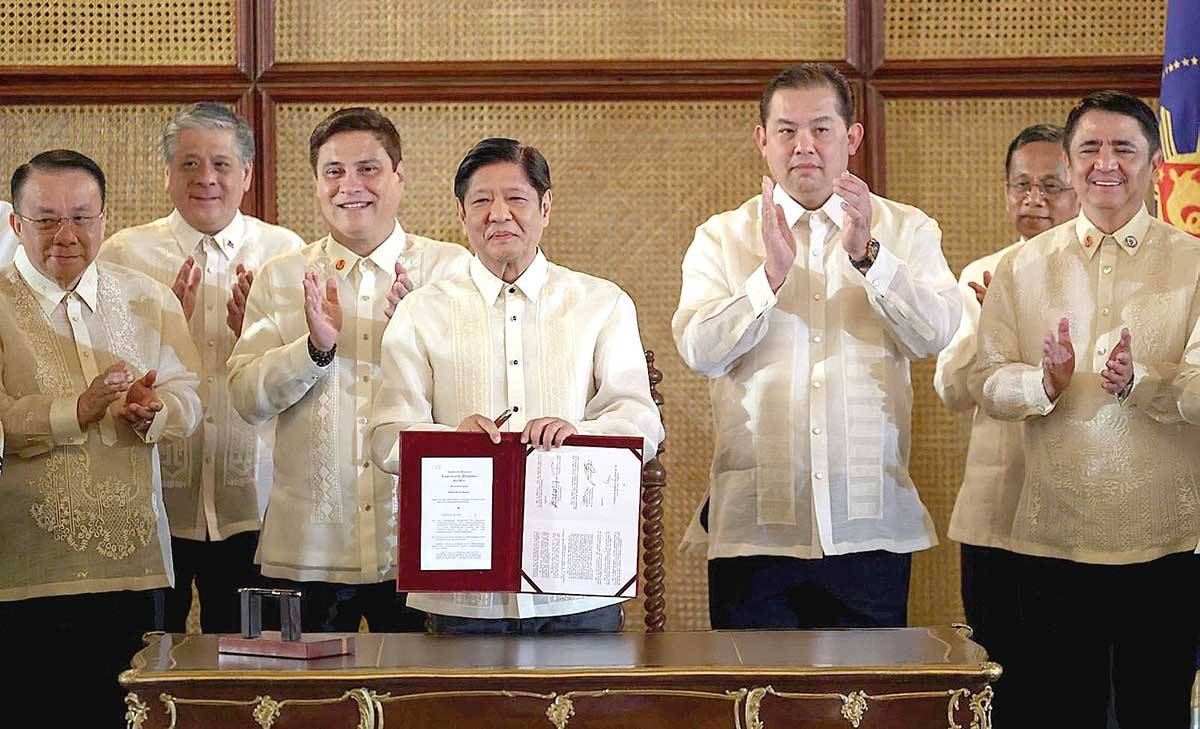President Ferdinand Marcos Jr. took a significant step on Monday by signing two laws that aim to strengthen the Filipino economy and improve the lives of older citizens. These laws, Republic Act (RA) 11981, also known as the “Tatak Pinoy Act,” and RA 11982, the “Expanded Centenarian Act,” have been enacted to promote Filipino-made products and provide financial assistance to elderly citizens.
The Tatak Pinoy Act (RA 11981) is designed to support local businesses in manufacturing goods that meet global standards. By encouraging the production of high-quality Filipino-made products, this law aims to enhance the competitiveness of local industries in the international market. This is a significant step towards building a strong nation, as it fosters economic growth and creates more job opportunities for the Filipino people.
On the other hand, the Expanded Centenarian Act (RA 11982) provides financial assistance to all Filipinos who reach the age of 80 and beyond. Under this law, individuals who reach the age of 80 will receive a cash gift of P10,000. This amount will be given every five years until they reach the age of 95. This initiative recognizes the contributions and sacrifices of older citizens and aims to improve their quality of life during their golden years.
During the signing ceremony at Malacañang, President Marcos Jr. expressed his appreciation for the efforts of the House and the Senate in passing these laws. He emphasized that bicameralism, the collaboration between the two bodies, played a crucial role in the successful enactment of these laws. This achievement demonstrates the government’s commitment to promoting the welfare of its citizens and building a prosperous future for the country.
While President Marcos Jr. signed two laws on Monday, he did not enact a third proposed law, the Magna Carta of Filipino Seafarers. The Presidential Communications Office (PCO) Secretary Cheloy Garafil stated that the measure was currently under further review. The Magna Carta of Filipino Seafarers aims to enhance the rights and working conditions of mariners, standardize employment contracts, and ensure quality training for Filipino seafarers.
This proposed law is particularly significant as it addresses concerns raised by the European Commission regarding the Philippines’ compliance with international maritime safety standards. The European Maritime Safety Agency (EMSA) flagged the country for not meeting the standards outlined in the International Convention on Standards of Training, Certification, and Watchkeeping (STCW). This deficiency puts the jobs of tens of thousands of Filipino seafarers at risk.
President Marcos Jr. has emphasized the importance of the Magna Carta of Filipino Seafarers in resolving these issues and strengthening the training and accreditation of Filipino seafarers. By complying with international standards, the Philippines can provide assurance to the international community that it prioritizes the safety and well-being of its seafarers. This is crucial considering that the Philippines is the largest source of seafarers globally, according to the United Nations Conference on Trade and Development.
In conclusion, the enactment of the Tatak Pinoy Act and the Expanded Centenarian Act signifies the government’s commitment to promoting local industries and supporting older citizens. These laws will contribute to the economic growth of the country and improve the lives of the Filipino people. While the Magna Carta of Filipino Seafarers is still under review, its implementation will address concerns raised by the international community and ensure the safety and well-being of Filipino seafarers. These legislative efforts demonstrate the government’s dedication to building a strong and prosperous nation.







